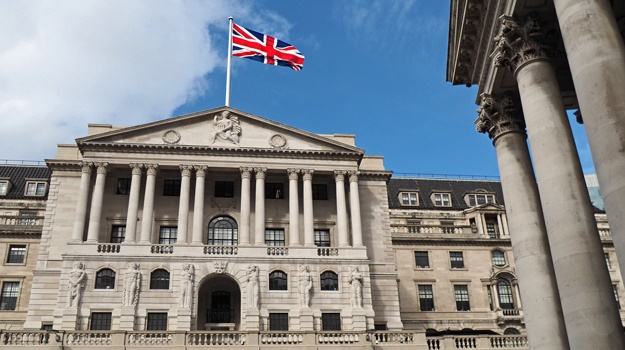
The Bank of England raised interest rates by the most in 33 years but strongly pushed back against market expectations for the scale of future increases, warning that following that path would induce a two-year recession.
The Monetary Policy Committee voted 7-2 to lift rates by 75 basis points to 3%, the highest level in 14 years. But in an usually blunt comment on investors’ outlook for future hikes, it stressed the peak in rates will be “lower than priced into financial markets.”
Staying on the market path used in the forecasts, which peaks at around 5.25% next year, would knock 3% off GDP and ultimately push inflation to zero, the BOE said. An outlook based on rates staying at their current 3% level implies a shorter, shallower recession and sees inflation fall close to target in two years’ time.
Markets have already slightly tempered their view since the forecasts were closed, with expectations going into the meeting suggesting rates would peak at 4.75%.
The size of the November hike will “reduce the risks of a more extended and costly tightening later,” the MPC said in the minutes to the meeting.
The dissenters were Swati Dhingra, who voted for a half-point rise, and Silvana Tenreyro, who preferred a quarter point.BOE Governor Andrew Bailey will address the decision at a press conference at 12:30 pm London time.
The three-quarter point move was anticipated by investors and economists.But while the BOE said more rate hikes may be required, potentially even “forcefully’’ if inflation pressures look persistent, the forecasts were a clear warning that market rate expectations have overshot.
The BOE warned the UK economy faces a ‘very challenging outlook.’’
Its forecasts imply the UK is already in recession, and that GDP will fall for eight straight quarters until mid-2024.
GDP will fall thanks to “higher energy prices and materially tighter financial conditions,” the BOE said, signalling that elevated borrowing costs will hammer households and businesses.
Part of that tightening comes from the market chaos that followed former Prime Minister Liz Truss’s botched fiscal plan in September.
That sent mortgage rates soaring to 14-year highs, hurting households already suffering under a cost of living crisis caused by rising energy and food costs.
The bank estimates that the refinancing the average £130 000 mortgage at current rates would increase annual interest payments by £3 000. Around 2 million households will need to remortgage by the end of 2023.
Under the BOE’s central outlook using the market rate path, hundreds of thousands of jobs are lost as unemployment rises from 3.5% to 6.4%. Inflation falls to 1.4% in two years, well below the 2% target.If rates are frozen at 3%, inflation falls back to 2.2% in two years, suggesting further rate rises may be needed, but then falls to 0.8% after three years.
Even then, the UK does not escape recession. GDP contracts 1.7% under the constant-rate scenario, thanks to a double-dip recession that sees just one positive quarter for growth between now and the end of 2023. Unemployment still rises to 5.1%.
The jumbo rate hike comes as the BOE is grappling with the highest levels of inflation in four decades with little sign that pressures are easing. Core inflation, which strips out volatile energy and food prices, is at 6.5% and private-sector regular wages are rising at a pace not seen in more than 20 years.
The BOE is also playing catch-up with the US Federal Reserve, which has raised rates by 75 basis points at four consecutive meetings to a range of 3.75% to 4%. The US central bank quashed market hopes for a pivot yesterday by signalling rates may move more slowly but to a higher-than-expected peak.
The BOE faces an even tougher balancing act. Higher rates threaten to bear down on growth just as the government imposes another round of austerity and tax rises.Its forecast, which doesn’t take into account the consolidation due to be announced in the 17 November Autumn Statement that will squeeze GDP further, assumes that the energy support package will remain universal but be roughly halved for the following 18 months after it ends in April.
The government has said it will consider more targeted support than its current £2 500 cap for the annual average household bill.If support was to be £500 below the BOE’s midway assumption, inflation would be roughly 1 percentage point lower over the each of the first two years.

